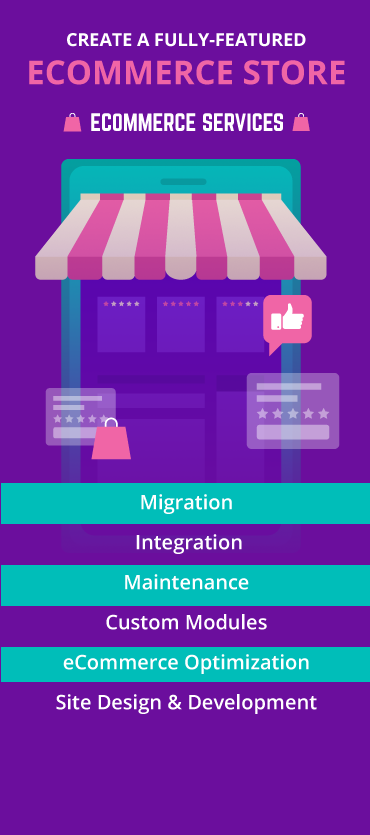“If your business is not on the internet, then your business will be out of business.”
– Bill Gates.
The ongoing pandemic has drastically impacted eCommerce as a whole.
With many shoppers wary about the safety of in-store shopping, Buy Online, Pick up In-Store (BOPIS) touched a whopping 259%, as of August 2020!
This shows that now is the time to start your online store. Especially when the eCommerce industry is over a trillion dollars worth.
However, most of the business owners scramble to understand where to start exactly.
In this blog post, we talk about how you can build an eCommerce website from scratch in just 4 steps, so it is a roaring success.

But before we dive deeper, let’s take a look at the importance of building an online store:
Here are some key findings:
- There are approx 12 million-24 million eCommerce sites across the globe
- eCommerce will make up 22% of global retail sales by 2023.
eCommerce is definitely booming!
Without further ado, here are 4 steps to establish an online store.
Step 1: Decide What You Are Going to Sell
The first step of starting an online business is to decide on the products you wish to list in your store.
People often start by asking themselves, “What can I sell to make good money?” However, that’s not the right question. Flip it, and question yourself, “What do people need and will pay money for?”
Now, choosing what to sell is more about figuring out a product that already has an existing demand but less competition.
You can do this by taking a look at Amazon since it’s the king of all eCommerce stores.
Also keep in mind that you are choosing to sell online, not a brick-and-mortar store.
It’s simply about what will sell and not about what you love!
Step 2: Name Your Brand
Once you have narrowed down the list of products you wish to sell on your online store, it’s time to think of a name. The challenge here is to choose a relevant and available domain name for your eCommerce.
Remember, your brand name should:
- be easy and short
- reflect your brand and what you sell
- not have a different meaning in any other language
Also, keep in mind that the name you will choose shall define your brand and what you do.
Step 3: Choose Your Sales Channels
With so many channels offering to sell your products, it may be a daunting task to choose one. With innumerable options to explore, each platform has its pros and cons. Try to figure out what makes sense for your business, audience, brand, and products.
So, How Do You Decide?
Here are a few factors that will help you choose the right platform:
Your Business Model:
- Do you have your own manufacturing firm?
- Do you have a dropshipping business?
Your Revenue and Cash Flow Cycle:
- Do you accept Google Wallet, PayPal, ApplePay?
- Do you agree to pay a commission fee if needed?
Your Brand’s Position in the Market:
- Have you just stepped into the market?
- Are you a luxury brand?
- Is your business known for the unique products you sell?
Your Audience:
- Does your audience spend a lot of time surfing the products you sell?
- Is your product for a specific group of people or interests the mass population?
Having an answer to all these questions will help you choose the perfect sales channel for your business.
Step 4: Advertise Carefully
When planning to sell online, it is very important to have a well-planned advertising strategy which is not an easy task. With so many online shoppers, the competition is tough for eCommerce stores.
So much so, that it becomes difficult to figure out where to start. Google ads, social media, or email?
Thereby, if you need to build a successful eCommerce advertising strategy, there are a few things you need to cover:
- Understand your target audience
- Ensure your eCommerce website is optimized
- Figure out where your audience spends their time
- Leverage strategies like marketing automation and retargeting
Regular maintenance
Your job doesn’t end when the development and design of your webstore are finished. If you wish to keep it running, it is important to maintain it constantly.
Make sure you optimize your store regularly, track visitor performance, and analyze how the end-users are communicating with your webshop.
Wrapping Up:
To sum up, establishing an online business, especially right now is a great idea. But remember it’s not going to be a cakewalk. You could face challenges when it comes to registering, promoting, or fetching your first sales. Once you overcome that and earn a name for your business, it’s all done.
eCommerce is advancing with infinite possibilities at this moment. So, jump right in and start your online venture!
Want To Know More About Establishing an eCommerce Store? Let’s talk!











